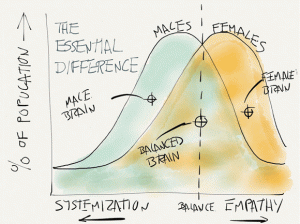Math Class is Tough
“Math Class is Tough”
By: Shannon Laughlin
The belief that women and men have different rational and emotional proficiencies is not a new idea. In fact, the history of science is peppered with claims that if the two sexes seem to differ in certain abilities, then they must be “hardwired” differently. For example, the Ancient Greeks believed that due to their cold-hearted nature, women must have been the result of a fetus who did not gather the necessary “natural heat” in order to achieve a virile spirit. Charles Darwin reasoned that women were evolutionarily inferior to men and had to sacrifice their own progression for emotional strength. Luckily, radical beliefs such as these are no longer prevalent today, but there are still small notions that perpetuate the idea of talent inequality between the sexes, such as the 1992 Teen Talk Barbie doll stating that “math class is tough” and proceeding to ask about the latest gossip. (Here’s the video in case you don’t believe me).
Along with this societal stereotype, there is an inequality of men and women in math and science careers throughout the world. A 2005 statement from then-president of Harvard University, Larry Summers, sparked a biological perspective on the issue with his suggestion that women have a natural inferiority in the subject. More recently, Simon Baren-Cohen has come up with something called the “empathizing-systemizing (E-S) theory,” which states that women and men often have different types of brains, one being an empathizing brain while the other is systemizing. However, the data behind this theory is weak at best, and a bounty of opposing research shows no difference in empathizing vs. systemizing in men and women.
Baren-Cohen’s theory already starts out considerably unsound due to the nature of his proposal. The fact is, we can only recognize trends and patterns that men and women display; there is no actual proof in the “male-female” brain types. All the points he provides are simply observations that have found to be different between the sexes.
Most of the statistics he cites demonstrating that women are more empathetic than men are studies of babies, ages 0-3, which assume that because a trait appears early, it must be inherent. And many scientists- including Nora Newcombe- argue that just because something shows up early does not mean it can be assumed genetic. The studies claim that from birth, females look at people more, have a better ability to infer emotions, and have a greater concern for others. However, other studies have found that boys and girls develop in similar ways during early life. This casts doubt upon the sex differences Baron-Cohen tries to prove. Also, similar studies have been done with newborns looking at people vs. looking at objects. Almost all were inconclusive, stating that no difference could be found in this area. Thus, it cannot be said that women are naturally more empathetic because the research Baron-Cohen provides isn’t consistent with other studies.
As for proving that men are better “systemizers,” Baren-Cohen’s evidence is almost entirely standardized tests that men outscored women in, such as the SAT-Math, the Water Level test, the Rod and Frame test, map reading tests, mental rotation, and many others. This makes for a relatively weak argument because it is shown that standardized tests are poor indicators of ability. The SAT-M test specifically shows a large difference between men and women, but in college math classes women regularly outperform men. A study at the University of California, Berkeley, shows that women with identical SAT scores to men obtained higher GPAs in every major on campus, including math and science. The report determined that women should add about 140 points to their SAT score to accurately predict their college performance. Baren-Cohen then claims that disorders like autism are a result of a “hyper-systemizing male-type brain.” This is not accurate at all, because it doesn’t account for many of the neurological challenges people with autism face, such as seizures and motor symptoms. At large, it cannot be asserted that men have a better systemizing brain than women.
Accompanied by the flawed data to prove the men and women brain types is an even bigger hole: the relationship between systemizing and empathizing. Baren-Cohen states the two brain types as opposites, and makes the case that the more empathizing (female brain) you are, the less systemizing (male brain) you will be. However, research has suggested that there is an extremely weak correlation between the two.
In sum, Baren-Cohen’s empathizing-systemizing (E-S) theory cannot be confirmed due to doubtful evidence and large lapses in proof. It cannot be concluded that men and women are proficient in different areas. To summarize his point, Baren-Cohen finishes by saying that the inequality of men and women in the sciences should not be an issue because fixing it would lead to prejudice against sexes instead of judging a person as an individual. However, I have to disagree. The lack of women is a vital issue in STEM- we should be striving towards equality of status, of income, and ensuring balance in the workplace. It all boils down to the stereotypes and sexism that have been so deeply rooted in our history (see intro paragraph). It is unfair that women have to overcome cultural biases to enter and stay in a STEM job, when there is no proven difference been their work and a man’s. Individually, we can’t change the stereotypical way the media portrays women, but we can make a difference by preventing the girls we know from feeling culturally prescribed pressures, and telling them that math class is no tougher for them than for their male peers.
Links:
http://www.icr.org/article/darwins-teaching-womens-inferiority/
http://digitalcommons.salve.edu/cgi/viewcontent.cgi?article=1016&context=jift
http://www.bu.edu/autism/files/2010/03/Carter-et-al-JADD-20071.pdf
http://www.sciencedirect.com/science/article/pii/S0191886907004217
http://www.aps.org/publications/apsnews/199607/gender.cfm
Pictures:
http://www.chicagonow.com/listing-toward-forty/files/2013/11/barbie-math-is-not-hard-sm.jpg
https://www.designedforlearning.co.uk/wp-content/uploads/2013/04/the-essential-difference.gif
http://link.springer.com/article/10.1023%2FA%3A1018759308259

